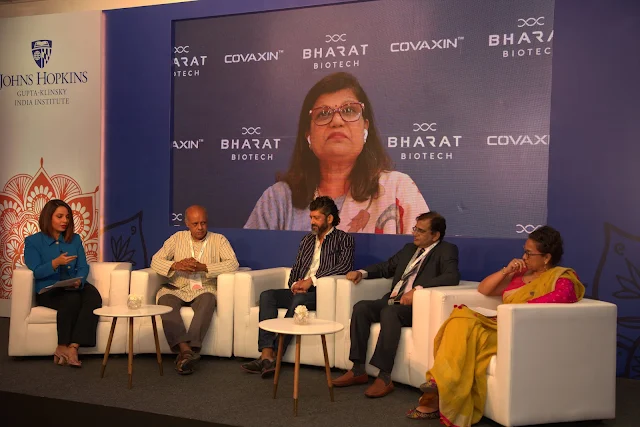 |
| Milton S. Eisenhower Library, Johns Hopkins University |
Founded in 1876, Johns Hopkins is the oldest research university in the United States. The research University named for its first benefactor, the American entrepreneur and philanthropist Johns Hopkins.
A leadership delegation from GKII is in India to further these ties through discussions with existing and potential partners and panel discussions. The first panel event was held in Mumbai today to discuss and explore opportunities to advance research and innovation and promote science for societal good. The session, “Tech for Good: India Inc.’s Commitment to Research and Innovation,” included noted industry leaders from India’s science and technology sector.
Keynote speaker, Dr. Saurabh Garg, CEO, UIDAI, and panelists including Suchitra Ella, Co-Founder & Joint MD, Bharat Biotech, Neera Nundy, Managing Partner & Founder, Dasra, Dr. Subhasis Chaudhuri, Director, IIT Bombay, Shekar Sivasubramanian, CEO, Wadhwani AI, and Viresh Prashar, Founder & CEO, Fruitfal, highlighted the role of the private sector in creating opportunities and lowering barriers to interdisciplinary knowledge sharing and shaping emerging technologies of the future.
India’s investment in R&D is $48 billion per annum, ranking 7th globally. However, at 0.7% of GDP it falls short of the top 15, pointing to a role that the private sector can fill with increased engagement. The private sector in India contributes 37% of the total national R&D expenditure, as compared to other countries where the private sector contributes the most; China and Japan are at 77%, United States at 71% and Germany at 68%. Collaborative work will focus on efforts that advance science, foster stimulating partnerships in research and innovation, and promote private sector engagement.
Speaking on this, Dr. Saurabh Garg, keynote speaker and CEO, UIDAI said, “The Indian Government has always been keen on public private partnerships in key sectors. We are ensuring that R&D becomes a critical part of both the start-up and the industrial policy. A key part of the Government role would be to build those pathways from the lab to research.”
Dr. Sunil Kumar, Provost, Johns Hopkins University said, "Moving the needle on private sector contribution to research will not only help India boost innovation, but it can also have an effect of making the Indian research ecosystem more attractive as a destination for research globally. It’s also important to provide incentives to scientists of Indian origin who are training or working elsewhere to return to set up labs in India. We believe that industry can work with the government and academia to enable this.”
One of the roles of the Gupta-Klinsky India Institute is to bring together Johns Hopkins’ faculty, staff, students, and alumni to engage with the private sector in India to learn and work on high quality, solution-based initiatives that can be employed globally for sustainable social impact. The collaboration with India Inc. as a key stakeholder is intended to spark new ideas and partnerships, leverage local, international and instructional resources, and promote interdisciplinary education opportunities.










 IndianWeb2.com is an independent digital media platform for business, entrepreneurship, science, technology, startups, gadgets and climate change news & reviews.
IndianWeb2.com is an independent digital media platform for business, entrepreneurship, science, technology, startups, gadgets and climate change news & reviews.
No comments
Post a Comment